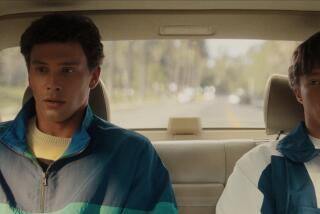Movie review: ‘Drive’
“Drive” is a Los Angeles neo-noir, a neon-lit crime story made with lots of visual style. It’s a film in love with both traditional noir mythology and ultra-modern violence, a combination that is not ideal.
Danish filmmaker Nicolas Winding Refn won the best director award at Cannes, and it’s easy to see why this tale of an emotionless wheelman (Ryan Gosling) who lives to drive and makes a rare stab at human connection with a fetching neighbor took the prize. Impeccably shot by Newton Thomas Sigel, “Drive” always looks dressed to kill. Making fine use of Los Angeles locations, particularly the lonely downtown streets around the L.A. River, “Drive” has a slick, highly romanticized pastel look calculated to win friends and influence people.
Less user-friendly is the film’s disturbing violence. “Drive” doesn’t spend a lot of time on mayhem, but what does get put on screen is intense, unsettling and increasingly grotesque and graphic as the film goes on.
For fans of director Refn, known among chaos aficionados for made-in-Europe violent fare like “The Pusher” trilogy and “Bronson,” this is bloody business as usual. But the mayhem here so clashes with the high style and traditionalism of the rest of the film that when the bloodletting goes into overdrive, so to speak, it throws you out of the picture, diluting the mood rather than enhancing it.
Certainly there could be no more familiar character to movie fans than the film’s protagonist, so iconic he’s reminiscent of Alain Delon’s Jef Costello in Jean-Pierre Melville’s classic “Le Samourai” and as written by Hossein Amini from the James Sallis novel so self-consciously mythologized he doesn’t even have a name.
Coolly played by Gosling, the driver is a monosyllabic loner with a monotone voice, a toothpick in his mouth, and a fondness for a silver racing jacket with a giant yellow scorpion on the back. By day he works in a garage on Reseda Boulevard run by hard luck Shannon (“Breaking Bad’s” Bryan Cranston) and does stunt driving for the movies. Once the sun goes down, he drives getaway cars for criminal types.
“There are 100,000 streets in this city,” the driver says, echoing the famous “there are 8 million stories in the naked city” line of yore. Just tell him where and when to pick you up — and don’t even think about making him wait more than five minutes — and he promises to ferry you to safety. For a price.
“Drive” opens with what might be its most successful, least violent set piece, a getaway from a robbery choreographed to quietly insistent techno music by Johnny Jewel. As he plays cat and mouse with L.A.’s finest, the driver reveals himself to be a highly proficient, emotionless technician with nerves of tempered steel. When the man pulls on his leather driving gloves, it’s best to get out of the way.
Trying to keep as low a profile as possible, the driver lives in an apartment building next to MacArthur Park and shops in the picturesque Big 6 supermarket nearby. To say that he is closed off to all forms of human emotion is putting it very mildly indeed.
But, hey, wouldn’t you know it, living right down the hall from the driver is Irene (Carey Mulligan, underutilized), an attractive young woman who does have a name. She also has a young son named Benicio (Kaden Leos) who the driver inexplicably takes a fatherly interest in. Whatever this film’s strengths, psychological motivation is not one of them.
Before this platonic idyll can get out of first gear, Irene’s husband Standard (the gifted Oscar Isaac) comes back from the prison where he’s been conveniently warehoused and the driver prepares to retreat into his mythic shell.
But wait. Standard comes home to trouble with some bad guys, bad guys who make the mistake of threatening Irene and young Benicio. Ever the knight errant, the driver volunteers his help, but everything starts to go wrong in ways that lead to all that bloodshed.
Though many aspects of “Drive” are, for better or worse, intentionally familiar, there is one element that is different, and that is Albert Brooks’ performance as Bernie Rose, a genial but dangerous criminal of the driver’s acquaintance. The actor brings a fine air of scornful, eccentric menace to the role. When people die in his presence, it’s not laughter they’re dying of.
More to Read
The biggest entertainment stories
Get our big stories about Hollywood, film, television, music, arts, culture and more right in your inbox as soon as they publish.
You may occasionally receive promotional content from the Los Angeles Times.











